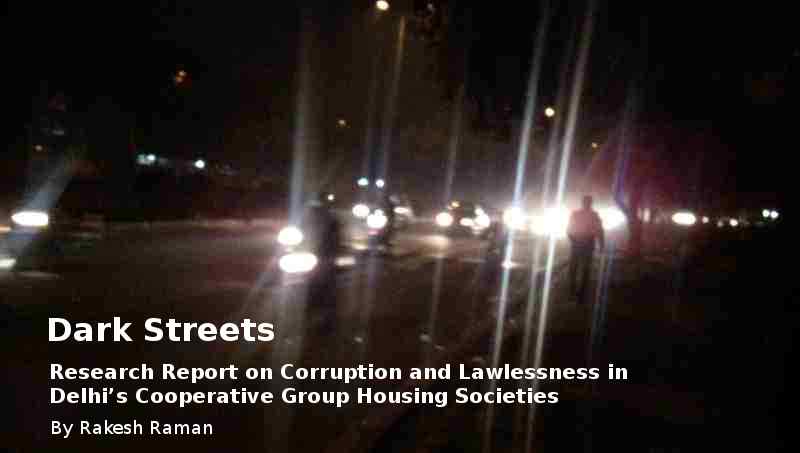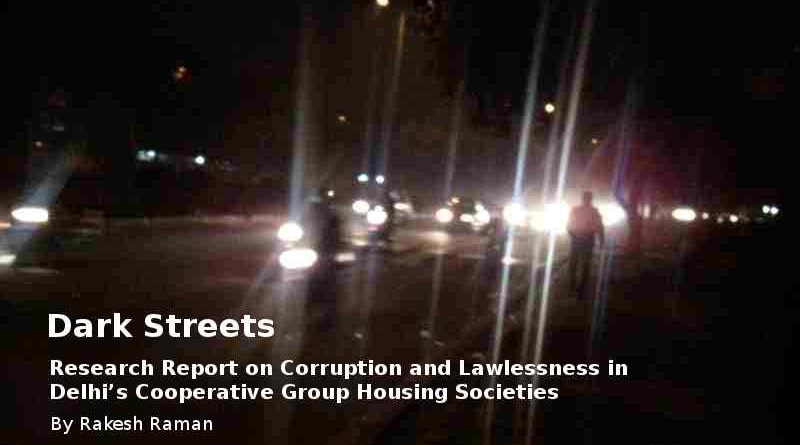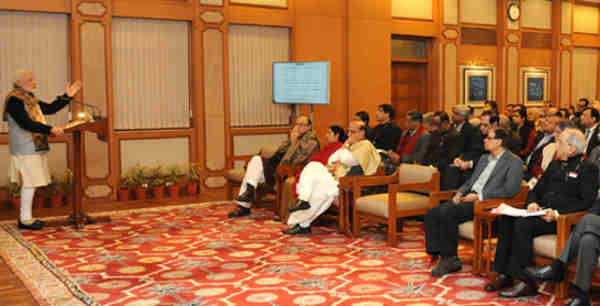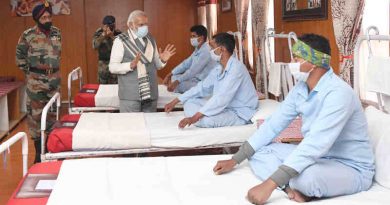Dark Streets: Research Report on Corruption in Delhi’s Housing Societies

Dark Streets
Research Report on Corruption and Lawlessness in Delhi’s Housing Societies
By Rakesh Raman
Today, Delhi is under the control of political parasites and incompetent bureaucrats who have made the city a crime capital of India. While millions of people are suffering, incidents of corruption and lawlessness are increasing at an alarming pace particularly in Delhi’s cooperative group housing societies.
Report Summary
As the corruption methods have always been evolving in India, the contemporary system of corruption has assumed the form of an organized trade in which corruption has become a non-issue.
Now it is not only the bureaucratic and political corruption that is troubling ordinary Indians, but in the recent years small groups of white-collar criminals have started operating like extortion gangs in the housing complexes. These gangs operate under the garb of managing committee (MC) members in different group housing complexes.
This report focuses on massive corruption and illegal activities in Delhi’s Cooperative Group Housing Societies (CGHS) where millions of people live.
Although the office of the Registrar Cooperative Societies (RCS) is supposed to control the society MCs, it has repeatedly failed in fulfilling its responsibilities honestly. The archaic RCS rules are also not effective to ensure smooth and transparent operations in the housing societies.
As a result, the MCs of various housing societies are involved in serious crimes such as financial frauds, extortion, blackmailing, human rights violations, labour rights abuse, criminal intimidation, environmental damage, and extreme corruption.
While millions of common residents are victims of the terror unleashed by the corrupt MC members of different cooperative group housing societies, these residents are not ready to raise their voice against the growing injustice because they fear reprisal from MC members.
The report highlights a nexus between MC members and government officials who are mostly supported by corrupt politicians and deep-pocketed builders. It also mentions the names of government departments which are part of the growing racket.
The report further describes various crimes in housing societies with the help of case studies and offers certain recommendations assuming that the government may use them to check corruption and lawlessness in Delhi’s Cooperative Group Housing Societies.
The author of this research report – Rakesh Raman – runs an exclusive community-driven online service under the banner “Clean House” to help the suffering residents of Delhi raise their voice against the growing corruption and injustice in group housing societies where millions of people live.
He has interacted with hundreds of residents and various government and law-enforcement officials in order to understand and report about corruption and other illegal activities in Delhi’s cooperative group housing societies.
Corruption in India
In his Gettysburg speech of 1863, the-then U.S. President Abraham Lincoln introduced America’s representative democracy as the “government of the people, by the people, for the people.”
Inspired by this principle of democracy, many progressive nations adopted it as the system of governance for the well-being of their people. India was one of them. However, things have gone topsy-turvy during the past 70 years – after India got independence from the Britishers in 1947.
Today, India has completely distorted Lincoln’s slogan and it has become a “country of the corrupt, by the corrupt, for the corrupt.”
Although corruption has spread like a pandemic disease in the entire country, this report is focused on Delhi’s cooperative group housing societies which have become dens of corruption and lawlessness under the criminal activities of the managing committee (MC) members who work hand in glove with the corrupt government officials.
As corruption has reached alarming levels, it is being observed that no government in India is willing to stop corruption because it has become the lifeblood of Indian bureaucrats and politicians.
A new “Freedom in the World 2017” report – released by Freedom House, a Washington-based independent watchdog organization – highlights rampant political and bureaucratic corruption in India. It reveals that corruption has a negative effect on government efficiency and economic performance.
“Though politicians and civil servants at all levels are regularly caught accepting bribes or engaging in other corrupt behavior, a great deal of corruption goes unnoticed and unpunished,” the report said in its findings.
And Delhi’s cooperative group housing societies – where millions of people live – present an ugly example of corruption that the Freedom House report has revealed.
Corruption and Its Impact
Corruption is not only a crime but it is also an immoral act. According to the Vigilance Manual 2017 of India’s top anti-corruption organization Central Vigilance Commission (CVC), corruption is manifested in various forms such as bribery, nepotism, willful action or willful inaction to benefit someone or to deny benefit to someone known or unknown.
It also states that corruption includes cases of favoritism and failure to follow laid down processes leading to unintended benefit to someone or denial of benefit to the deserving.
Among the other descriptions of corruption, a global anti-corruption organization Transparency International suggests that corruption thrives on low level of transparency. Wikipedia, a leading online encyclopedia, defines systemic corruption (or endemic corruption) as corruption which occurs because of weaknesses of an organization or a process. This type of corruption can be contrasted with individual officials or agents who act corruptly within a system.
Wikipedia further states that factors which encourage systemic corruption include conflicting incentives, discretionary powers; monopolistic power structures; lack of transparency; low pay; and a culture of impunity.
|
Traditional Forms of Corruption |
||
| Bribery | Extortion | Embezzlement |
|
Factors That Encourage Corruption |
||
| Conflicting Incentives | Discretionary Powers | Monopolistic Structures |
| Lack of Transparency | Low Pay | Culture of Impunity |
Specific acts of corruption include “bribery, extortion, and embezzlement” in a system where corruption becomes the rule rather than the exception.
Corruption is negatively associated with the share of private investment and, hence, it lowers the rate of economic growth. Corruption, according to Wikipedia, creates the opportunity for increased inequality, reduces the return of productive activities, and, hence, makes rent-seeking (practice of manipulating policy for increasing profits) and corruption activities more attractive.
“This opportunity for increased inequality not only generates psychological frustration to the underprivileged but also reduces productivity growth, investment, and job opportunities,” Wikipedia says.
Corruption Factors in India
The factors that contribute to increased corruption in India include flawed electoral processes, political and bureaucratic illiteracy, lack of domain expertise among government officials, inefficient and obsolete administrative systems, lack of transparency, and weak policy implementation mechanisms.
The factors also include lack of opportunities for public to participate in the administrative reform process, archaic school and college education systems, centralized administration, limited technology usage, low or no press freedom, poverty, and government attacks on civil society organizations.
Obviously, it is almost impossible for any government in India to overcome all these challenges while the corrupt and corruption are thriving. Although Indian politicians loudly claim that they will weed out corruption from the country, corruption has always been increasing exponentially.
|
Main Factors That Contribute to Increasing Corruption in India |
||
| Flawed Electoral Processes | Political and Bureaucratic Illiteracy | Lack of Domain Expertise |
| Obsolete Administrative Systems | Lack of Transparency | Weak Policy Implementation |
| Archaic Education Systems | Centralized Administration | Limited Technology Usage |
| Low or No Press Freedom | Attacks on Civil Society Organizations | Poverty |
Corruption was the main factor for the debacle of the Congress-led government in 2014 and corruption will be the most crucial issue in the Lok Sabha Election that will take place in 2019. As the Indian governments have failed to stop corruption, it is increasing rapidly in all spheres of activity – including in the housing societies of Delhi.
Cooperative Group Housing Societies
The idea of cooperative societies has its origins in Mahatma Gandhi’s thinking of collective development in the society by forming small groups of contributors in different spheres of human activity.
While Mahatma Gandhi believed that cooperative societies are ideally suited organizations for development in the villages, he floated the `Gram Swaraj’ concept. In the post-independence era, however, India replicated Gandhi’s cooperative model in urban areas also.
As a result, the government empowered cooperative societies so they could become change agents in the socio-economic development of the country. Cooperative group housing societies are supposed to be part of the larger cooperative movement in India.
But Mahatma Gandhi must be spinning in his grave looking at the sorry state of affairs in India’s housing societies – particularly in Delhi. They have become dens of corruption under the corruption of management committee (MC) members, while the Delhi Government has no control on them.
Corruption in Cooperative Group Housing Societies
Today, according to Delhi Government’s office of the Registrar Cooperative Societies (RCS) – which is supposed to supervise the operations of societies – there are nearly 2000 cooperative group housing societies in the city.
While the managing committees (MCs) of these societies – which are elected through flawed election processes – operate as money-grabbing gangs, they handle public money worth crores of rupees.
It is estimated that the MCs collect nearly Rs. 2,500 crore every year from residents / members of societies and the total cash that they handle is about 2 lakh crore rupees (approximately USD $30 billion).
The total money availability with the MCs increases significantly as they frequently carry out fraudulent construction projects in the inhabited buildings. The total money in circulation – including the frequent construction activity in housing societies – is approximately USD $50 billion. It is estimated that 20% of this amount – or USD $10 billion – is corruption money.
Obviously, the amount of money available in the housing societies’ pervasive network is enough to attract corrupt forces including MC members, government officials, politicians, and builders. Together, they are operating as a massive crime syndicate to swindle public money.
Clean House Service
As millions of common residents in Delhi are victims of the terror unleashed by the corrupt MC members of different cooperative group housing societies, I have started an exclusive editorial section under the banner “Clean House” to help the suffering residents raise their voice against the growing injustice.
If you want Clean House to report about corruption and other illegal activities happening in your housing society, you may please contact me with relevant documents and details.
Click here to visit Clean House.
While corruption is happening openly, the government ostensibly takes some anti-corruption measures. However, since politicians and government officers are part of the corruption racket they never enforce their own policies to stop corruption.
For example, in order to make society operations transparent, the government had ordered all societies to make their websites. Although some 3 years have elapsed since the order was released, most MCs have brazenly defied the government’s advice.
According to the government notification from the Registrar Cooperative Societies (RCS), the step has been taken to ensure transparency in the working of the societies and to access their data online. The website creation is mandatory / compulsory for each housing society, the government order had specified.
The notification also stated that the government has taken the step on the advice from Delhi Cooperative Tribunal, which wants all the societies to have their own websites. The Tribunal observes that if the proceedings or the notices to the members are uploaded on the website, the litigation would decrease.
The litigation has been increasing because the RCS office and other concerned offices have failed miserably to provide relief to the residents who are victims of irregularities and nefarious activities of the MCs in different societies.
The RCS office had directed the MCs of societies to submit their website address to the RCS office within 45 days from the date of the notification. The office also warned the MCs that if they failed to comply, actions as per law may be initiated.
However, only a handful of societies have made their websites which do not carry information to ensure transparency. The MC members use the society websites to propagate only their own interests while they do not upload the important communications such as purchase procedures and objections / suggestions from other members on the websites.
Thus, the MCs are openly defying RCS orders but the RCS office does not take any action against the MC members because there seems to be a strong nexus between MC members of different societies and the officials of RCS.
Flawed Financial Accounting in Societies
While the MC members of each housing society control public money worth crores of rupees, they always tend to gobble that money blatantly. In most societies, same members keep holding office positions by hook or by crook. They offer various types of bribes to voting members to win elections fraudulently. Their procedures for holding General Body Meetings (GBMs) are totally flawed. They do not follow statutory purchase processes. Their accounting procedures are defective.
Most societies try to hoodwink their members by distributing printed audit reports and annual returns, which conceal more than what they reveal. These reports and returns are meaningless in the absence of purchase procedures, which most societies do not follow.
|
Irregularities in the Operations of Cooperative Group Housing Societies |
|
| Flawed Election Processes | Faulty Procedures to Hold GBMs |
| Dubious Financial Processes | Static Administrative Systems |
| Lack of Transparency | Weak Communications |
| No Accountability of MC Members | Incompetence of MC Members |
The societies are supposed to upload on their websites all financial and purchase information along with related documents – such as need for purchase, expenditure approval process, request for quotations (RFQs), tendering procedures, criteria for selection of vendors, payment terms, project monitoring, quality assurance, and so on.
However, since the societies prefer to work in a totally shady and opaque manner, they do not reveal such information to the individual residents and the government. As a result, they squander public money at will and just distribute crude annual reports and returns, which are not sufficient to present a true financial accounting picture.
This is nothing but corruption on the part of MCs and the government has failed to take any action against the MC members of different societies who are responsible for these financial irregularities that result in fleecing the residents of the societies.
Incidentally, most residents are not even aware that they are being cheated by the MCs because they find it difficult to decipher the complex accounting reports.
As corruption is rampant, the MC office bearers are always eager to make a fast buck and spend individual members’ money unscrupulously without taking proper approvals. They also plan and execute unnecessary (and sometimes illegal) high-value construction projects within the society buildings without following the proper approval and expenditure norms.
If the government – as part of the thorough inquiry – could ask the past and present MC members of all housing societies to declare their assets, it will find that most have assets disproportionate to their known sources of income. Obviously, their assets should be attached by the government and they must be punished.
Law-Breaking Decisions
The general body meeting (GBM) approval process is totally flawed and the government / RCS office has not bothered to streamline the process despite numerous complaints by the society members.
Moreover, the residents suggest that the GBM approvals – if taken in a transparent and truthful manner – should be applicable only to petty issues such as cleaning, gardening, or cultural activities in the societies. The GBMs must not be used to take financial decisions that are usually imposed on members.
But MC members of different housing societies are exploiting the flawed GBM process and majority rule to even challenge the Indian constitution and law.
As corrupt MC members impose their own ill will on residents, in many societies they have gone so berserk that they even ignore court orders and continue their criminal pursuits.
For example, the increasing number of cars is a major irritant in Delhi because of traffic hassles and increasing vehicular pollution. The Delhi High Court has ruled that only one car per flat will be allowed in housing society parking lots.
But Delhi Government has failed to check the menace and playing hand in glove with the corrupt managing committees of the housing societies that allow residents to park multiple vehicles inside the society premises under some secret deals with the law-breaking residents.
Worse, these corrupt residents supported by MCs gang up to show their majority in the GBMs and get even the illegal decisions approved, as it is happening, for example, in illegal extended construction projects currently happening in multiple housing societies.
They even threaten the innocent residents who oppose MCs’ illegitimate acts. The threats from criminal MC members to opposing resident include false police complaints against them, legal cases, warnings of physical harm, and even death threats.
Here is another example of lawlessness. The National Green Tribunal (NGT) of India observes that one of the major sources of air pollution is dust emission from construction activities. NGT rules that such construction must be stopped to avoid pollution-related diseases and deaths of people including men, women, and children.
The NGT has been enacted under India’s constitutional provision of Article 21, which assures the citizens of India the right to a healthy environment.
However, the MCs of housing societies are treating the NGT’s advice with total disdain, as illegal construction under the dubious floor area ratio (FAR) rules is rampant in societies where people are living.
It is believed that the MCs are taking approvals from different government departments for extended construction by bribing the government officials in concerned departments such as the DDA (Delhi Development Authority) and other urban development authorities.
While the Delhi Government has failed to check this construction-based pollution in the occupied societies, it should carry out a thorough investigation in the illegal construction cases and demolish all the constructed structures in housing societies that have tried to circumvent the regulations using corrupt practices.
Government must punish the guilty government officials and MC members who have flouted the government norms so that new construction projects could be stopped.
Extended construction in existing societies also results in human rights violations, as the Government of India has expressed the idea that every citizen has a right to clean air.
Dust pollution will be harmful not only to the societies where construction is happening, but it will engulf the surrounding areas also, making it difficult for millions of people (including children) to breathe.
It is also surprising to note that on one side the Delhi Government is trying to reduce vehicular pollution in the city, but on the other it is allowing construction-related dust pollution in housing complexes – which is more hazardous for people who are living there.
The crimes being committed by MC members of housing societies include financial frauds, extortion, blackmailing, human rights violations, labour rights abuse, criminal intimidation, environmental damage, and extreme corruption.
Failure of the Government to Stop Corruption
The MC members of the cooperative group housing societies have to deal with various government departments to run the society affairs. However, the RCS office of the Delhi Government is responsible to ensure corruption-free environment in the societies and protect the rights of residents.
However, it is seen that RCS officials are not discharging their duties honestly and they usually do not take any action against the corrupt MC members. Most would know that the RCS office has a long history of corruption and many of its officers have been caught even by the Central Bureau of Investigation (CBI).
The main government departments that are systematically supporting the corrupt MC members of different housing societies are:
- Registrar Cooperative Societies (RCS) of the Delhi Government
- Delhi Development Authority (DDA)
- Office of the Lt. Governor (LG) of Delhi
- Office of the Chief Minister and other Ministers of Delhi
- Municipal Corporations of Delhi (MCD)
- Delhi Fire Service (DFS)
- Delhi Urban Art Commission (DUAC)
- Delhi Police
Threats
In order to thwart my anti-corruption efforts, the corrupt people are sending multiple threats to me. These include false police complaints against me, threats of physical harm to me, expulsion notices, legal notices, and slanderous attacks on my social as well as professional status. But I am not deterred and I will keep fighting truthfully against their crimes and corruption to get the culprits arrested and imprisoned.
Some of the active cases of corruption and illegal activities at various housing societies are given below. You can click the case weblink to read the full report.
|
ACTIVE CASES |
|||
| Case | Department | Report Date | Status |
| Inquiry of IAS Officer | RCS | July 9, 2018 | Inquiry Initiated |
| Illegal Surveillance | Delhi Police | July 2, 2018 | Complaint Filed |
| Bureaucratic Corruption | RCS | June 11, 2018 | Inquiry Expected |
| Complicity in Corruption | RCS | May 29, 2018 | Case in Progress |
| Corruption in FAR | DDA | May 21, 2018 | CVC Inquiry |
| Corruption and Fraud | RCS | May 19, 2018 | Inquiry Delayed |
| Illegal Construction | Court Case | May 14, 2018 | Construction Stopped |
| Corruption Inquiry | RCS / CVC | May 1, 2018 | Pending |
| Risk of Fire | Fire Service / RCS | April 14, 2018 | No Action |
| Labour Rights Abuse | Labour Court | March 13, 2018 | Summons Issued |
| Obstruction of Justice | RCS | February 26, 2018 | Illegal Obstruction |
| Financial Fraud | RCS / DDA | January 29, 2018 | Inquiry Planned |
| Criminal Intimidation | Labour / Delhi Police | January 21, 2018 | Notice Ignored |
| Corruption Inquiry | RCS | January 3, 2018 | Notice Issued |
| Tree Offence | RCS / DDA | December 26, 2017 | Notice Issued |
| Slavery Case | RCS / Labour | December 20, 2017 | Inquiry |
| Blackmailing and Extortion | RCS | December 17, 2017 | No Action |
| Corruption Notice | Society MC | December 10, 2017 | Response Demanded |
| Human Rights | RCS / Delhi Police | May 15, 2017 | Suppressed |
| UBBL Violation | DDA / RCS | August 30, 2017 | No Action |
| Labour Exploitation | RCS / Labour Dept. | October 3, 2017 | Notice Issued |
| Fraudulent Contract | RCS / DDA | October 16, 2017 | Response from DDA |
| Illegal Construction | DDA / RCS | October 24, 2017 | No Action |
| Illegal Car Parking | RCS / DFS | October 30, 2017 | No Action |
| Corruption and Conspiracy | RCS | November 20, 2017 | Reported |
Corruption Case Study
If you want to know how corrupt MC members of a housing society commit various crimes and circumvent the law because of Delhi government’s weakness in stopping crime and corruption, you can study the case of DPS Housing Society in Dwarka.
Click here to visit DPS Housing Society webpage.
Despite complaints from residents, corrupt government officials do not take any action against corrupt MC members. Finally, the distressed residents are left with no other option, but to approach the courts. But do they get justice from courts? The less said about the Indian courts, the better.
Remedial Actions
Today, an estimated one-fifth of people – in Delhi’s population of about 20 million – reside in group housing societies. These residents need to be saved from the cruel hands of corrupt MC members and government officials.
Most of the MC members or office-bearers of resident welfare associations are totally incompetent to manage society affairs in a professional manner but they enjoy mysterious protection from corrupt government officials.
The residents who willy-nilly support the MCs in their misdeeds are equally ignorant and thus culprits who should be punished according to the law. Surprisingly, some of these culprits are government employees or employees of the organizations that are regulated by the government.
If the government wants to stop the rising tide of corruption, it must take strict action against such employees who have become part of the racket and support illegal activities in housing societies.
A similar onus is also on private organizations which are supposed to control their mischievous employees who are directly or indirectly involved in any illegal or immoral activities happening at the housing societies.
There is no denying the fact that avoidable building construction around human beings is a wrongful act. It also promotes corruption. Since construction or massive building repair involves huge money which can be easily swindled, it is the root cause of corruption. So, corruption in the name of construction must be stopped.
The government must also realize that Delhi is already among the the world’s most polluted and dirtiest cities. If the construction is not stopped in the existing housing societies of Delhi, the city will become a virtual hell for all living beings.
Then the DDA may have to change its slogan from “Proudly We Build The Capital Of India” to “Slowly We Destroy The Capital Of India.” Is the government ready for this perilous transition?
More importantly, the law-enforcement agencies should carefully study the complaints from citizens and immediately take punitive actions against the rogue MC members and corrupt employees of departments such as DDA and RCS.
In order to protect the interests of millions of people living in the cooperative group housing societies of Delhi, the Home Ministry of the Government of India through the office of the Lt. Governor (LG) of Delhi must create a special department to handle the complaints of the residents in a time-bound manner.
Technology Interface
Such a complaints monitoring department should be fully computerized eliminating the need for complainants to meet the government officials who harass them during physical interactions in order to extort bribes from them.
The online interface or “help desk” of the complaints monitoring system should be made available in such a way that the complainants should be able to view the progress of their cases remotely on their computers or mobile devices. The government should take immediate action against the employee if a case gets stuck.
But there are chances of resistance. As most bureaucrats and politicians in India are uneducated or they lack domain expertise, they do not know how to use information technology-based systems such as emails, social media, and video conferencing to deliver citizen services. They also lack communication skills that are required to respond to public complaints over digital channels.
These bureaucrats and politicians shamelessly call common people – including women and senior citizens – to their offices to hear their complaints which are hardly resolved. It is estimated that nearly one-third of the traffic on roads is of people who go to meet government officials while all these meetings can be avoided by using digital communication channels. This avoidable traffic is also increasing pollution levels in the city.
While bureaucrats and politicians work like viceroys of the British colonial era, they take sadistic pleasure when people stand outside their offices and bow in front of them. These forced official meetings are also increasing corruption which is already rampant in government offices.
The eCommittee of the Supreme Court of India and the Department of Justice (DoJ) of the Government of India have observed these difficulties that commoners are facing.
The eCourts Mission Mode Project – which is a national eGovernance project for technology enablement of courts in the country – encourages the use of digital technology including video conferencing to resolve different cases.
Therefore, the government officials who do not know how to use digital systems to provide government services have no right to call public to their offices. The government should also terminate the services of such naive officials who cannot keep pace with the modern digital world.
In the case of housing societies, the offices like the RCS and DDA which are known for their corrupt practices should be directed that they should never call common people or complainants to meet their officials. They can call only the accused managing committee (MC) members to question them.
The government must realize that the current online complaint filing systems in all government offices are utterly useless. There is a need to create dynamic digital interfaces where the complainants should be able to monitor the movement of their complaints (along with official remarks) at every stage of their case.
Such interfaces will also increase transparency and reveal the performance of government officials for delivering online citizen services.
The government must understand that the current administrative system that is supposed to ensure a corruption-free environment in Delhi’s cooperative group housing societies is totally dead. There is a need to create a new system of governance. The sooner the better.
Recommendations
- As the RCS office has failed to discharge its duties responsibly, the government must not allow it to handle the affairs of cooperative group housing societies.
- The government should set up a dedicated quasi-judicial department with domain experts and professionally qualified people to deal with matters related to all group housing societies.
- The new cooperative housing department must use robust technology interfaces to interact with public. It should also create separate Web-based subdomains for each housing society in order to ensure full transparency.
- The new department should have its branches in different group housing areas of Delhi and it should provide single-window services to residents.
- A qualified full-time government administrator should be appointed in each housing society. The salary of the government administrator should be paid from society funds.
- The current RCS rules are mostly redundant and irrelevant. So, a new set of rules should be created for the societies to run their operations efficiently.
- The election process in the cooperative group housing societies must be totally revamped. Only educated and skilled people should be allowed to contest society elections.
- The elected members should be asked to declare their assets periodically in order to reduce chances of corruption.
- As the administrative systems are generally slow, police and law-enforcement agencies should be given more powers to check crime and corruption in group housing societies.
- The new cooperative housing department should run regular community outreach programs to increase public participation in the reformation process.
By Rakesh Raman, who is a national award-winning journalist and social activist. He also runs a free Education and Career Counselling Center for deserving children at a poor J.J. Colony in Dwarka under his NGO – RMN Foundation.
About the Author

Rakesh Raman is a government’s National award-winning journalist and social activist. Besides working at senior editorial positions with India’s leading media companies, he had been writing an edit-page column for The Financial Express, a business newspaper of the Indian Express group.
Nowadays, for the past about 7 years, he has been running his own global news services on different subjects. He also has formed an environment-protection group called Green Group in Delhi. He has created a comprehensive online information service to educate the Indian voters for the upcoming Lok Sabha election scheduled to happen in 2019.
He is also running an exclusive community-driven online editorial section under the banner “Clean House” to help the suffering residents of Delhi raise their voice against the growing corruption and injustice in group housing societies where millions of people live.
He has formed a free Education and Career Counselling Center for deserving children at a poor J.J. Colony in Dwarka, New Delhi under his NGO – RMN Foundation.
Earlier, he had been associated with the United Nations (UN) through United Nations Industrial Development Organization (UNIDO) as a digital media expert to help businesses use technology for brand marketing and business development.
Contact
Rakesh Raman
463, DPS Apts., Plot No. 16, Sector 4
Dwarka, Phase I, New Delhi 110 078
INDIA
You may please contact me on my email.
Disclosure: I have written this report not only as a journalist, but also as a victim of the fraud and intimidation happening in a Delhi Housing Society. I am facing repeated threats because I am raising my voice against corruption, lawlessness, environmental damage, and human rights violations.





